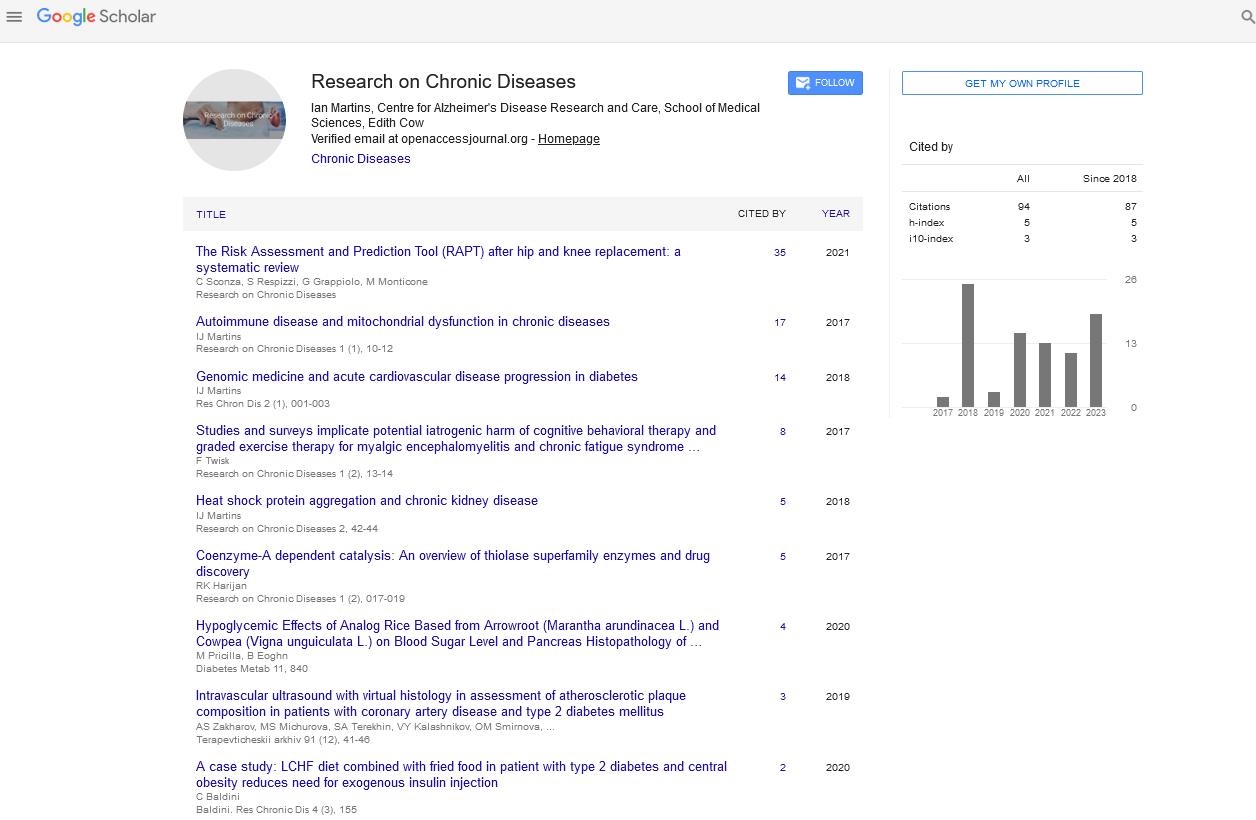Perspective - Research on Chronic Diseases (2024) Volume 8, Issue 2
Unveiling the Mysteries of Autoimmune Diseases: Navigating the Complexities of Self-Attack and Healing
- Corresponding Author:
- Angelica Zazzera
Department of Immunology,
University of Florence,
Florence,
Italy
E-mail: angelicazaz.zera@sdabocconi.it
Received: 06-Mar-2024, Manuscript No. oarcd-24-129017; Editor assigned: 11-Mar-2024, PreQC No. oarcd-24-129017 (PQ); Reviewed: 25-Mar-2024, QC No. oarcd-24-129017; Revised: 10-Apr-2024, Manuscript No. oarcd-24-129017 (R); Published: 17-Apr-2024, DOI: 10.37532/OARCD.2024.8(2).174-175
Introduction
Autoimmune diseases, a diverse group of disorders characterized by the body’s immune system mistakenly attacking its own tissues, pose a profound challenge to millions worldwide. From rheumatoid arthritis to multiple sclerosis, these conditions encompass a spectrum of manifestations, each with its unique set of challenges and consequences. In this article, we embark on a journey to unravel the intricate mechanisms underlying autoimmune diseases, exploring their impact on health and well-being, and shedding light on strategies for diagnosis, management and resilience in the face of adversity.
Description
Understanding autoimmune diseases
The immune system, a complex network of cells, tissues and organs, serves as the body’s defense against foreign invaders, such as bacteria, viruses and parasites. Under normal circumstances, it distinguishes between self and non-self, launching targeted attacks against pathogens while sparing healthy tissues. However, in autoimmune diseases, this delicate balance is disrupted, leading the immune system to mistakenly identify the body’s own cells and tissues as threats and mounting an attack against them.
The exact cause of autoimmune diseases remains elusive, but a combination of genetic predisposition, environmental triggers and dysregulation of the immune system is thought to play a role. Genetic factors, such as specific gene variants associated with immune function, may increase susceptibility to autoimmune diseases. Environmental triggers, including infections, toxins and stress, can provoke an aberrant immune response in genetically susceptible individuals, triggering the onset or exacerbation of autoimmune conditions.
Manifestations and impact
Autoimmune diseases can affect virtually any organ or tissue in the body, leading to a diverse array of symptoms and complications. Rheumatoid arthritis, for example, primarily targets the joints, causing pain, swelling and stiffness, while Systemic Lupus Erythematosus (SLE) can affect multiple organs, including the skin, kidneys, heart and brain, leading to a wide range of symptoms, from rash and joint pain to kidney failure and neurological impairment.
The impact of autoimmune diseases extends far beyond the physical realm, encompassing psychological, social and economic dimensions. Chronic pain, fatigue and disability can undermine quality of life, limiting mobility, independence and participation in daily activities. Mental health disorders, such as depression and anxiety, are common among individuals with autoimmune diseases, stemming from the burden of chronic illness, uncertainty about the future and social isolation.
Socially, autoimmune diseases can strain relationships, disrupt employment and exacerbate financial hardships. The unpredictable nature of these conditions, characterized by flares and remissions, can make it challenging for individuals to maintain consistent employment or fulfill caregiving responsibilities. Moreover, the financial costs associated with medical care, medications and supportive therapies can place a significant burden on individuals and families, further exacerbating socioeconomic disparities and barriers to access.
Diagnosis and management
Diagnosing autoimmune diseases can be challenging, as symptoms may overlap with other conditions and vary in severity and presentation. A comprehensive evaluation, including medical history, physical examination, laboratory tests and imaging studies, is essential for accurate diagnosis and tailored treatment planning. Blood tests, such as autoantibody assays and inflammatory markers, can help identify specific autoimmune markers and assess disease activity.
Management of autoimmune diseases aims to alleviate symptoms, prevent disease progression and optimize quality of life through a combination of pharmacological interventions, lifestyle modifications and supportive therapies. Nonsteroidal Anti-Inflammatory Drugs (NSAIDs), corticosteroids, Disease-Modifying Antirheumatic Drugs (DMARDs) and biologic agents are commonly prescribed to manage symptoms, reduce inflammation and suppress immune activity in autoimmune diseases.
In addition to pharmacotherapy, lifestyle modifications, such as regular exercise, balanced nutrition, stress management and adequate sleep, play a crucial role in managing autoimmune diseases and promoting overall health and wellbeing. Physical activity can improve joint mobility, muscle strength and cardiovascular health, while healthy dietary choices can reduce inflammation, support immune function, and maintain a healthy weight.
Supportive therapies, including physical therapy, occupational therapy and psychologicalcounseling, are valuable adjuncts to pharmacological treatment, helping individuals cope with pain, disability and emotional distress. Education and self-management programs empower individuals to become active participants in their care, providing them with the knowledge and skills needed to navigate the challenges of living with autoimmune diseases and advocate for their needs.
Resilience and empowerment
Living with autoimmune diseases requires resilience, adaptability and self-compassion in the face of adversity. Coping with chronic illness, managing symptoms and navigating the complexities of healthcare can be daunting, but cultivating a sense of resilience and empowerment can help individuals overcome challenges and thrive despite their conditions.
Building a support network of family, friends, healthcare providers and peer support groups can provide invaluable sources of encouragement, validation and practical assistance. Sharing experiences, insights and coping strategies with others who understand the unique challenges of autoimmune diseases can foster a sense of belonging, reduce feelings of isolation and instill hope for the future.
Conclusion
Autoimmune diseases represent a formidable challenge, but they do not define individuals or dictate their futures. Through understanding, support and proactive self-care, individuals with autoimmune diseases can reclaim their lives, cultivate resilience and embrace a future filled with possibility and hope. Let us stand together as a community, united in our commitment to raising awareness, advocating for equitable access to care and fostering a culture of compassion and empowerment for all affected by autoimmune diseases.
